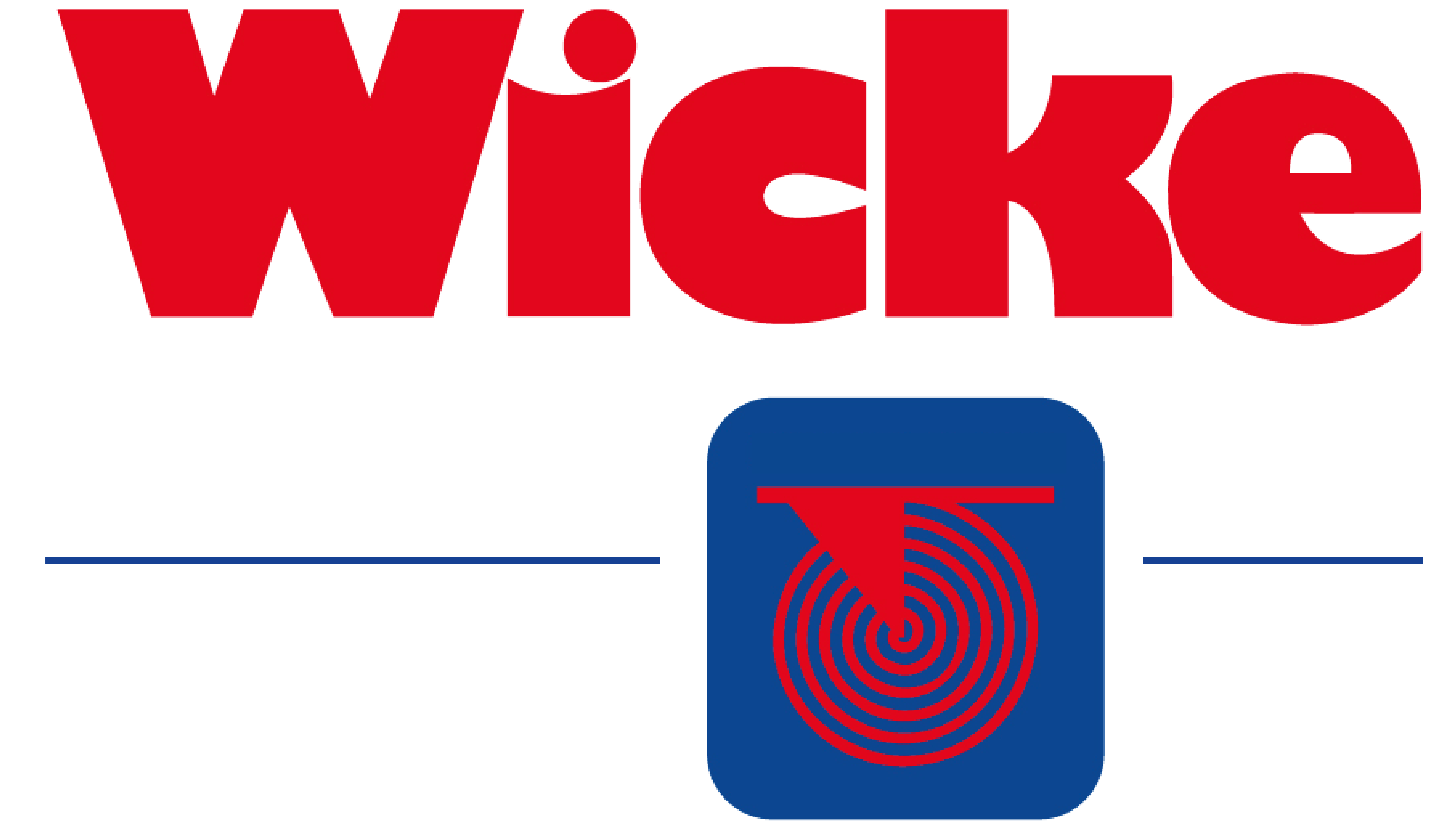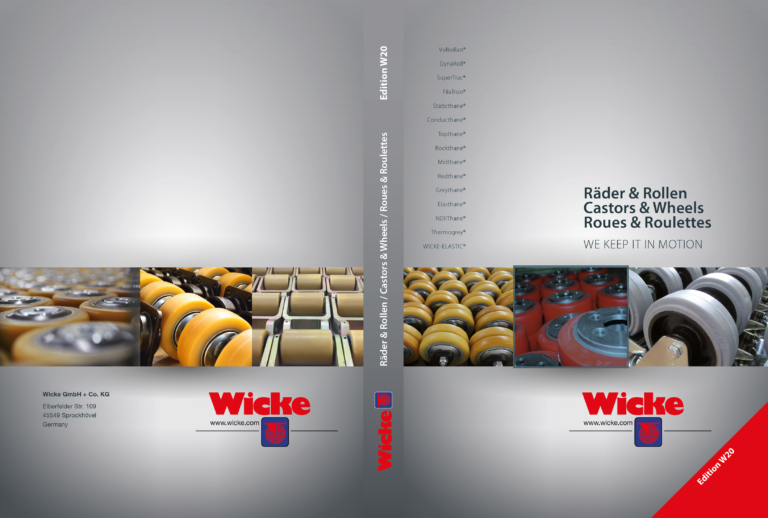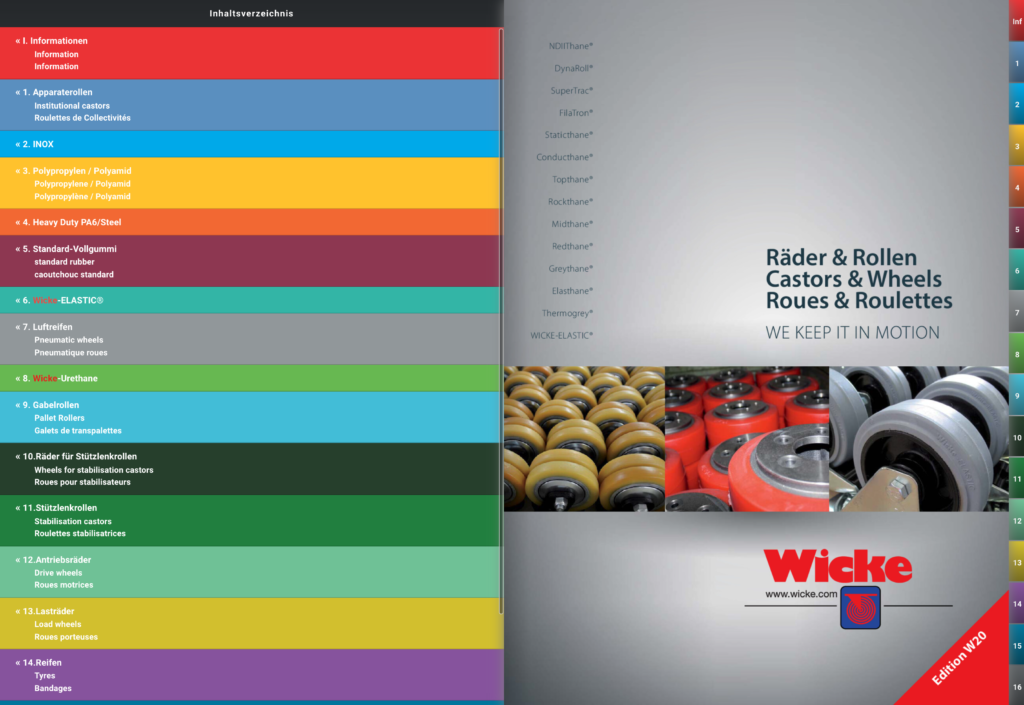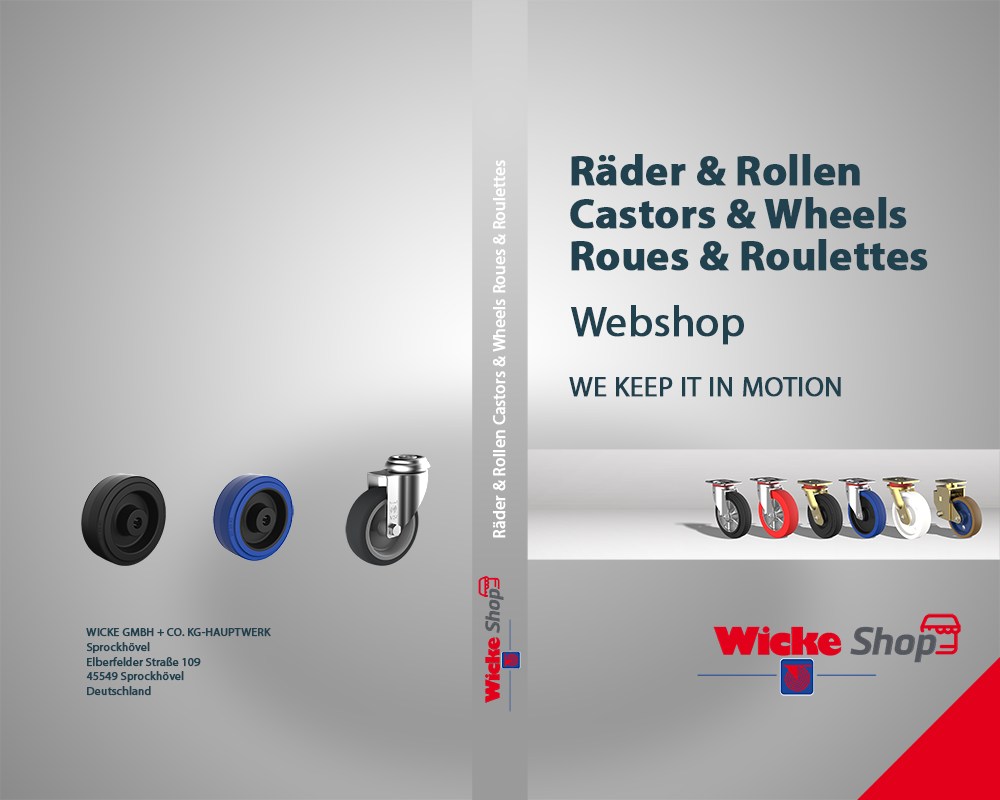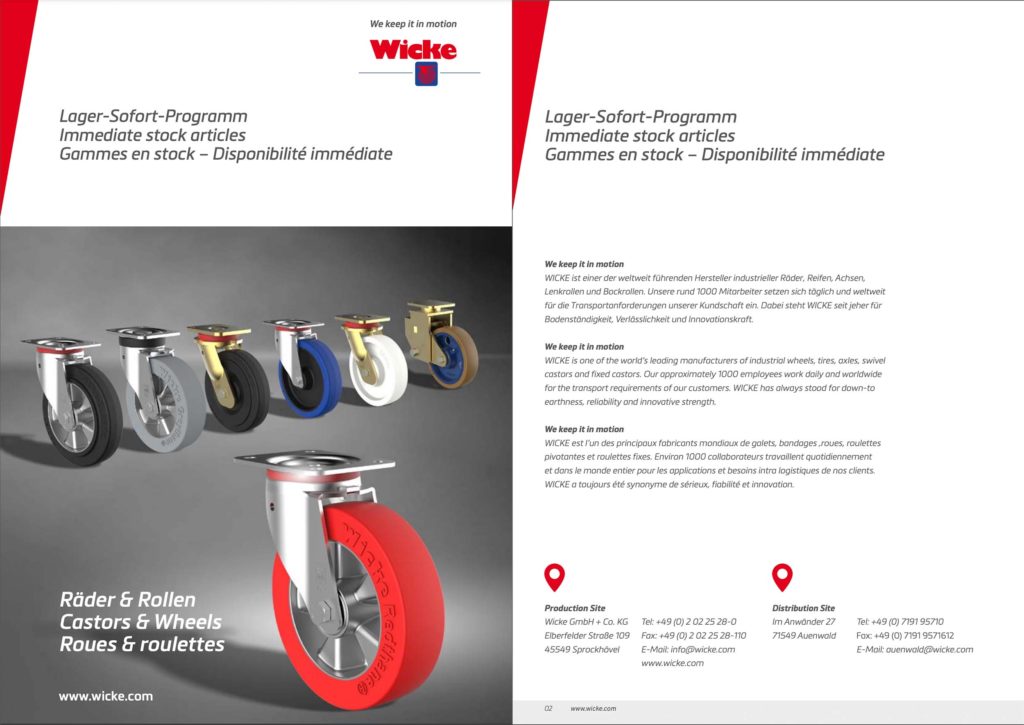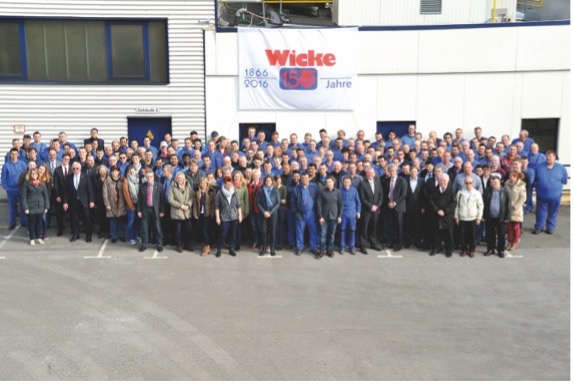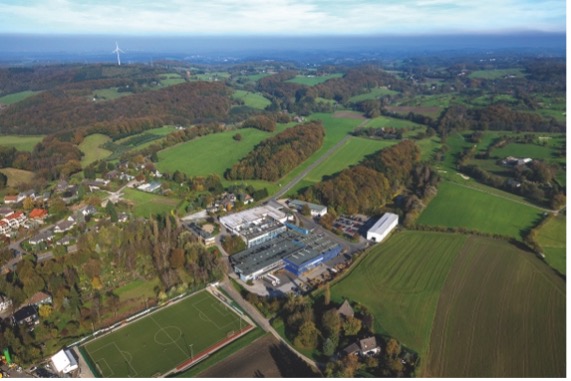Corporate Video
Whether heavy-duty castors for road construction machines, drive, support, and running wheels for forklift trucks, or complete wheel systems for cleaning machines, for decades now, Wicke products have been held in high regard by many large OEMs. Especially in the heavy-duty segment, this family-run champion from Sprockhövel in western Germany has set new standards of quality and utility. In view of this commanding position, it’s all the more astounding to think that it was chance more than anything that brought Wicke to wheels and castors.
Company portrait 150 years WICKE
Amorces made in Barmen
The history of the company begins in 1866 in Barmen (today a district of Wuppertal) when a man named Ferdinand Wicke set up a haberdashery. He soon started producing what were known as “amorces” at the time – percussion caps for toy pistols. His factory Ferdinand WICKE Zündwarenfabrik entered into a long period of growth which lasted through to the turn of the century. Following Ferdinand Wicke’s death in 1903, his sons expanded the product range, starting with the production of ignition systems for miner´s lamps and, in 1913, adding another range of caps for toy guns. In 1919, Wicke was sold to Otto von Ragué, who kept the name, running the company as Ferdinand Wicke: Successors – which proves just how established the Wicke brand had become by this stage.
"Unnecessary for the war effort"
Following the economic difficulties of the Weimar years, the aggressive rearmament of Germany under the National Socialists from 1933 led to an uptick in growth – both in the economy as a whole and at Wicke specifically. Yet during the ensuing Second World War, the situation changed dramatically. in order to keep up armaments production, the regime took more and more control of businesses, drastically cutting the production of consumer goods among other areas and diverting resources into the Nazi war machine. Wicke was to suffer under this policy as, on 13th May 1941, it was classified “unnecessary for the war effort” and shut down. It would not be until four years later, in May 1945, that the company would have the opportunity to restart production – yet not of any form of matches or lighters, as this was forbidden by the British occupation forces.
As such, Wicke would have to look for other fields of activity. As such, Wicke would have to look for other fields of activity – and it was here that Heinz Brennscheidt, having taken over from his uncle Otto von Ragué in 1935, hit on success, managing to get supply orders from Wuppertal’s Vorwerk, a large manufacturer of household appliances And so, with three workers and eight borrowed machines, Brennscheidt began turning and milling metal, successfully restarting the business before 1945 was out.
Wicke discovers the wheel
Wicke was ideally placed to profit from the economic miracle of the 1950s, the Wirtschaftswunder. The main reason for it was a licence to begin producing matches and lighters again from March 1950. Yet Wicke did not discontinue the new metalworking division as, by this stage, the company had already set up a small iron foundry. In 1951, this circumstance led directly to a key moment as, for the first time, WICKE received an order to produce lightweight metal rims for rubber tyres. It didn’t take long for the company’s management to recognise the enormous potential in producing wheels and castors for transportation in the beginning of an economic upswing; it soon decided to set up a full production arm. While its first product range in 1953 consisted of one sole product – aluminium double-disc wheels – by 1962, it was already manufacturing a full range of wheels as well as swivel castors and trestle castors. In 1964, plastic wheels made of polyamide put in their first appearance in the Wicke catalogue.
From 1970 onwards, a man named Klaus Schlösser – originally hired as a sales manager – drove another development in the business as market interest in heavy-duty castors increased. In Particular the growing market interest of heavy-duty castors increased. By the end of the decade, the annual turnover of the wheels and roller division was hovering around 12 million Deutschemarks. The next big step came in 1983 when the company was able to acquire a licence from Bayer (today Covestro) to use the high-quality Vulkollan® polyurethane plastic formula. through to the end of the 1980s, sales of wheels and castors had once again increased considerably, now posting around 80 percent of the company’s overall earnings. In 1990, management – made up of Heinz-Olof Brennscheidt (son of Heinz) and Klaus Schlösser as of 1989 – decided to focus the company entirely on transportation solutions. The matches and lighter arm was sold to WECO in 1990.
Wicke goes worldwide
This strategic refocussing at Wicke coincided with the end of the Cold War – and Wicke was not slow to take advantage of the new opportunities presented by globalisation and advance into new markets. As early as 1980, Wicke has been selling around 25 percent of its wheels and castors outside of Germany, and now went about setting up branches abroad: in 1993, it opened Wicke France in Héric in the Loire and, in 1995, a factory in Zlín in the Czech Republic began producing cast rims and forgings for forklift components. Nur drei Jahre später nahm in Tipton WICKE UK die Geschäftstätigkeit auf. Further branches followed in Ungarn, Polen, BeNeLux an in the USA.

Meanwhile, Wicke was present in China from 1994 on. Starting with 120 staff manufacturing standard export products. Around the Millennium, however, Wicke China underwent a notable expansion. Now Wicke China works with a staff of 450 to supply an extended product range to both international and Chinese customers. The Czech production site, too, has recently been expanded: in 2013, a new factory was opened in Slušovice, near Zlín. Specialising in vulcanised elastic rubber wheels up to 950mm diameter and fully-assembled system components for heavy-duty use.
Wicke in its 2016 anniversary year
“It is quite odd” says Klaus Schlösser, “when you look back at our history, and notice that, since 1866, pretty much everything about our company has changed. Our company is no longer owned by the Wickefamily; it is no longer located in Barmen, Wuppertal, and it doesn’t produce ammunitions any more. Then again, there are some continuities. We are still a family-owned, owner-managed business which, for all its international expansion, remains deeply rooted in its home region and always puts the freedom to take its own decisions and its ability to transform first. I think these continuities have played an important part in making us one of the leading manufacturers of transport solutions worldwide, with offices on four continents and more than 850 employees. Two other things were decisive here, too: the commitment our staff put into their work and the lasting trust our customers place in us.”
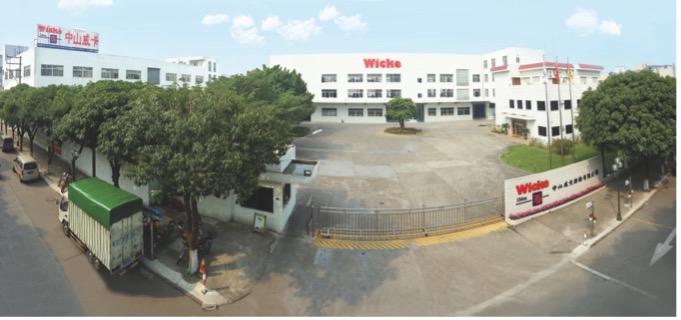
Wicke does not take either of these factors for granted. Wicke cannot, after all, insulate itself from demographic change. That is why Wicke is active in recruiting and training apprentices and takes a proactive stance on adapting working patterns to retain older members of staff. It is also a member of a consortium of employers, unions, and the regional government of North-Rhine-Westphalia, “Demografie aktiv”. On this occasion at Wicke will set up partnerships between younger and older members of staff who meet for regular exchanges of views and information. The idea behind these encounters is that both expert knowledge and personal experience can be handed down from workers approaching retirement age to their successors, thus remaining within the company. In 2014, Wicke’s efforts were recognised by “Demografie aktiv” with a certification.
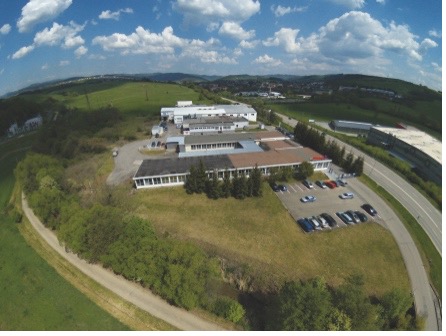
“We’re not limiting our efforts to our German headquarters, though”, says co-managing director, Christian Schrape. “In China, too, we have a targeted qualifications programme for our workers based on a range on internal training seminars and cooperation with universities and colleges in the region. This has a direct effect on us as a company: in May 2016, for example, we were able to open a new polyurethane production facility at our Chinese site. , along with an R&D department specialising on materials such as polyurethane, aluminium, and rubber.”
Another investment for the future to the tune of seven Euro digits recently went to the company headquarters in Sprockhövel. The switch to electricity generation using a gas-powered combined heat and power unit has now been completed there. This unit produces heat and electricity. The generated heat which can be used to run an absorption chiller, keeping the temperature in the factory halls down in the summer months. Allowing Wicke to shut down all of its oil-powered heating equipment – and reducing the company’s electricity bill by around a half. As such, the plant has two key advantages in that it both lowers energy costs and reduces CO2 emissions by around 1,000 tons annually Further investments have recently been made in warehousing logistics at the locations in Auenwald and Sprockhövel, which now run on high-rise shelving, representing a further improvement to the availability of goods and the speed at which they can be delivered. Further excellence initiatives are planned for 2016 to 2020 which will anchor production and automation in the company strategy – alongside two other key issues: the environment and staff.
